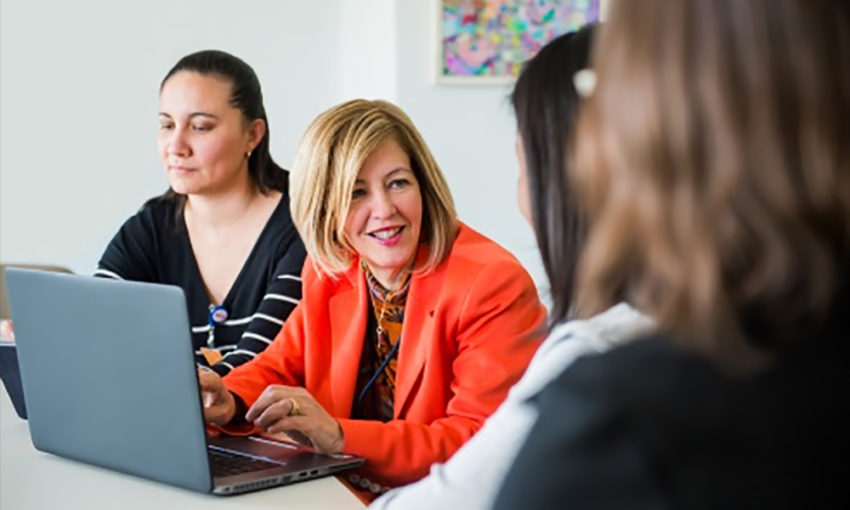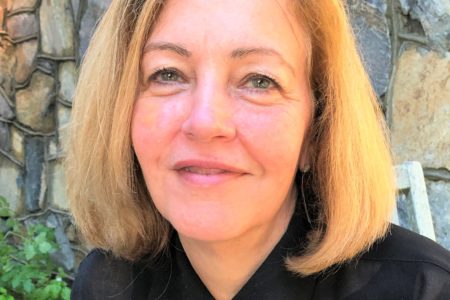
Share On Social!
With over 30 years of working in mental health and disparities research, Margarita Alegría is what you might call an expert in the field.
Alegría is the Chief of the Disparities Research Unit at the Massachusetts General Hospital and a professor in Harvard Medical School’s departments of medicine and psychiatry. Last summer, she was named Harry G. Lehnert, Jr. and Lucille F. Cyr Lehnert Endowed MGH Research Institute Chair.
Alegría has decades worth of experience in studying public health, mental health, substance abuse, and the social determinants of health. She’s conducted countless studies on how to improve the lives of ethnic and racial minority groups and people with disabilities.
Now she wants to make her research more accessible to the general public.
Alegría started a newsletter to share her findings with the audience she’s trying to help. She also built a civic leadership program to get young people involved in their communities. It all aligns with her goals to bring in the community to her research.
Alegría and Her Background and Expertise in Mental Health
Alegría is originally from San Juan, Puerto Rico. She left to attend her undergraduate studies at Georgetown University in Washington, D.C.
However, she returned to pursue her Master’s in psychology at the University of Puerto Rico, before moving back to the east coast to attain her PhD from Temple University.
Alegría has worked in research and directed several research centers, such as a disparities research center at the Cambridge Health Alliance and the Center for Evaluation and Sociomedical Research at the University of Puerto Rico.
Now she lives in Boston, Massachusetts, where she has been the Chief of the Disparities Research Unit at the Massachusetts General Hospital since 2015.
Alegría’s work focuses on mental health and surrounding issues.
“I’m very centered on trying to look for ways to improve policy programs and any sort of program or issues that have to do with practices to improve the lives of ethnic/racial minority groups, linguistic minorities, and now more people with disabilities,” Alegría said.

Initially, Alegría’s work helped understand the challenges of sex workers in Puerto Rico, looking at HIV and mental health. From there, she was interested in understanding the needs of poor populations in Puerto Rico.
“I started doing a very big needs assessment in Puerto Rico and following people in poor areas of Puerto Rico and seeing what their life was like, and the needs they had in mental health. A follow up cohort for three big waves of data was 3,500 people that we followed for a long time period, trying to understand what are the needs of people in Puerto Rico, but really learning a lot about how poverty is entrenched in so many aspects of people’s lives and limits opportunities,” Alegría said.
Alegría also had the opportunity to work on larger studies about immigration and mental health, which inspired her to study more about health disparities.
“I did a lot of work with a national Latino and Asian American study which was the biggest psychiatric epidemiologic study that was done on Latinos and Asians. And that also was a great experience. We interviewed more than 5,000 people, Latinos and Asians, and really understood what were the things that were linked to people’s mental health and the needs that people had, why people were not going to someone for care. After doing all of that work, we really decided to do more on disparities, especially seeing what limited access and quality of care people were experiencing,” Alegría said.
Her research in this study revealed the diversity within Latino and Asian ethnicities, and how mental health varies between different groups within Latinos and Asians.
“We also learned a lot about issues that had to do with the immigrant paradox, where people were saying how immigrants and migrants tend to have better health and better mental health. What we found is that does not exactly work for every ethnic/racial group, but actually that there were differences across the groups. And this also raised the issue that when we aggregate groups under Latino or Asian, we sometimes are just averaging out, but not necessarily pinpointing the differences and which are the groups that are at higher risk,” Alegría said.
Now her primary focus is on intervention development.
“I’ve spent probably the last 15 years trying to develop interventions throughout the lifespan of people trying to understand how can we improve the lives of people that are experiencing escalating levels of stress, that are really having limited opportunities, confronting a lot of racism and structural inequities,” Alegría said.
Alegría learned how to better conduct interventions through the study on Latino and Asian immigrants.
“I think what really was striking is how we found relationships that had not been presented in the literature. For example, the importance of language. Now when we do interventions, for example, we pay a lot of attention to doing the intervention in the language of the person, so we’re very interested in matching linguistically when we offer services,” Alegría said.
Alegría and Her Focus on Youth Civic Engagement
Another key research area for Alegría is helping young people from diverse ethnic/racial backgrounds who have struggled with mental health.
She and her team sought feedback from youth in Massachusetts about how to address high rates of anxiety, depress, and substance abuse.
“We wanted to go back to these communities and ask the youth themselves through what’s called ‘photovoice,’ to tell us with pictures and photos, the narrative of what was happening in their communities and in their neighborhoods, and then to plan with the youth themselves, what would be an intervention that they would want to work around this area?” Alegría said.
Alegría found that young people felt stigmatized by negative media portrayals of immigrant communities.
“Some of the youth were saying how some of their communities were actually depicted by the media very negatively, like the media was really not helping, but actually was stigmatizing their communities,” Alegría said.
The youth also spoke up about the impact of the high cost of living on stress.
“The other thing they said is the importance of going to the youth and asking them themselves. And they talked about the assets in their community, but also the obstacles in their community. And some of the obstacles that were having a huge impact in their lives were issues like gentrification, for example. They talked about not having affordable housing and having to leave their neighborhoods or their parents have to having to work two or three jobs to be able to afford staying in that same area, and how they were losing their social ties,” Alegría said.
Unfortunately, many Latino children struggle with mental health issues.
22% of Latino youth have depressive symptoms, which can be due to family issues, community and school issues like discrimination and poverty, according to a Salud America! research review.
Feedback from young people helped Alegría and her research team develop a civic engagement program for them to get involved with local issues.
The 12-session program works with youth to become leaders. The youth identify problems and work among themselves, with support from facilitators, to bring accountability to public officials.
One group developed a video about public officials understanding how the lack of affordable housing was having an impact on their life. Another group basically got the people from recreation services to provide space for them to meet,” Alegría said.
“Right now, we’re revising the program based on the feedback that the youth and facilitators gave us. And it’s now currently being tested in Mexico, by another group of youth to see how they’re doing. But I think it’s a really good way of empowering youth to see that they play a big role and have a voice in how to address the problems.”
Alegría Working to Craft a Newsletter to Reach More People
Alegría wants to make sure her research reaches as many people as possible.
That’s why she created a newsletter to send to people within the communities she’s trying to help.
“As part of being an academic, you write a lot of journal articles, but you actually don’t necessarily get the information to the people that need it most. And I felt that these academic journals are really not the way to go. And also, the conferences are more for research and academics, and not necessarily where you want to also hear from communities and what they think about this work and also, what things are we missing from the work we’re doing,” Alegría said.
Alegría hopes that her newsletter can equally inform minority communities about important research findings and how it applies to them. She also wants to gather feedback and showcase the work that people within those communities are doing to promote health equity.
“It’s more like a vehicle to bridge the community’s perceptions and problems. The communities are doing incredible amounts of good work that never gets showcased. My idea was, can we do this newsletter that does all of those things? It gives information about findings that the communities should at least hear about because they affect their wellbeing and health. It also gets the perspective of the communities and what do they think about these issues that are being presented, but also hear about the communities themselves. What are actions they’re doing that should be showcased for others, because they could be used as models,” Alegría said.
Alegría’s newsletter also gives resources to apps that can be used for mental health improvement.
“It’s more like having a conversation back and forth with the community,” Alegría said.
Alegría and Addressing the Mental Health Stigma
An important discovery for Alegría has been how the stigma of mental health varies for different age groups.
“I would say that for younger youth, the issue is confidentiality and finding someone that they trust. We’ve seen in data from the 15- to 25-year-old youth and adults, that those are the groups that are having a very, very hard time. So I think for them, we don’t see as much the stigma of using services, it’s more having access to someone that they feel they can relate to,” Alegría said.
Stigma against seeking mental health services is more common in older minority populations.
They may fear how their immigration status affects their ability to seek services or that it might impact their ability to seek jobs.
“I think it has to do with the worry about public charge, although now it has been taken out. People still feel very worried, ‘Is this information going to be used against me in any way?’ Or there has been a lot of news about information being leaked and so I think people were afraid of the information being use negatively. But the most that we hear about why people might not go is because they’re worried that if it appears in their files, they might not have opportunities for jobs or that even their primary care providers would treat them differently,” Alegría said.
Alegría is called to her work in mental health by knowing that her efforts can help better people’s lives.
“What keeps me engaged in this is that there’s so much that can be done for people. People don’t have to suffer by themselves. You see how people change dramatically, how people start getting better, how they feel like they have hope. I think it’s part of the social justice. I feel there’s so much we’re taking away from people, that this is one of the few things we can give them back,” Alegría said.
Alegría wishes that as a nation we prioritized mental health as much as we do money.
“I think in the United States, we’ve been so concentrated on financial and economic wellbeing, but actually to me where people should be should be investing is in the emotional wellbeing of people and especially of youth and children, to make sure that people can contend with the struggles that they’re having and making their life easier,” Alegría said.
A focus on social cohesion can help minority groups achieve health equity, according to a Salud America! research review.
We all have the ability to help each other with our mental health, according to Alegría.
“I think people don’t understand that even doing some acts of kindness every day can improve the lives of people in ways that you can’t imagine,” Alegría said. “We know that the more you know your neighbors, the lower the violence in that neighborhood. So getting to know people and trying to help people, it’s going to make also your mental health better.”
Image Credit: Main image from Mass General Hospital.
By The Numbers
3
Big Excuses
people use to justify discriminatory behavior
This success story was produced by Salud America! with support from the Robert Wood Johnson Foundation.
The stories are intended for educational and informative purposes. References to specific policymakers, individuals, schools, policies, or companies have been included solely to advance these purposes and do not constitute an endorsement, sponsorship, or recommendation. Stories are based on and told by real community members and are the opinions and views of the individuals whose stories are told. Organization and activities described were not supported by Salud America! or the Robert Wood Johnson Foundation and do not necessarily represent the views of Salud America! or the Robert Wood Johnson Foundation.



